初中英语现在完成时和一般过去时
现在完成时与一般过去时
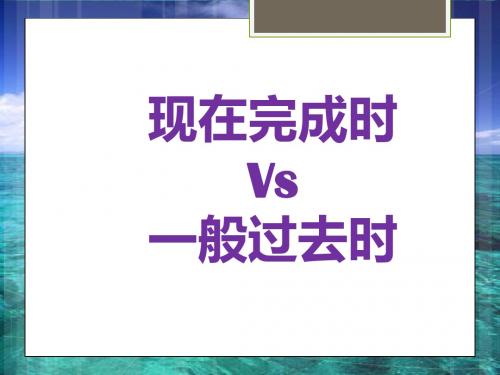
2. What have you been doing?
你一直在做什么?
3. I’ve been writing a laboratory report.
我一直在写实验报告。
PART B:EXERCISES
一.Find the choice : 1.When I was at school, I_______ to the library every day. A. go B. was going C. have gone D. went 2.The new books_______yet. A.haven’t arrived B.has’t arrived C.didn’t arrive D.don’t arrive
现在完成时 Vs 一般过去时
一.表示从过去某一时刻开始并一直延续到现在的动作 或事情,但动作或事情现在已经结束。
eg:1. Someone has just turned off the light.
有人刚把灯关了。
2. I have already finished my homework.
我已经完成了家作。 二.表示从过去某一时刻开始并一直延续到现在的动作 或事情,但动作或事情可能仍在继续。
到目前为止,今夏天气一直很热。
2. I haven’t seen her yet . 我还未见到过她。
五.可与现在完成时连用,也可与一般过去时连用 的时间状语: for +时间 ,this +时间
表示不确定时间:
ever,never,before,just,recently,already
eg: 1.
eg:1. I want to see how much the place changed since I saw it last.
初中英语八种时态讲解-课件PPT
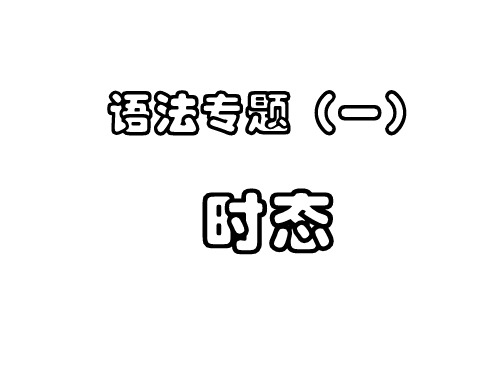
什么情况下用?
①表示经常或习惯性的动作或存 在的状态。②表示主语通常的能 力、兴趣爱好、和性格特征。③ 表示客观的事实或真理。④表示 按照时刻表或已经计划安排好的 将来行为。(只限于是go, come, leave, arrive, begin, start, take off, stop, be等表示开始或移动意义的 词。)⑤在时间状语从句和条件 状语从句中,主句用一般将来时 (will+动词原形),从句中用一般
变“y”为“i”再加-ed
worry→worried
cry→cried
1. He____(be, was, were, been) here a moment ago. 2. They ____(be, was, were, been) here just now. 3. The scientists _____(leave, leaves, leaved, left) for America yesterday. 4. Last week we ______(visit, visited ) the Science Museum. 5. When I was a child, I often ____(play, played) football. 6. The students ran out of the classroom as soon as the bell ____(ring, rang, rung).
一般过去时
概念:过去某个时间里发生的动作或 状态;过去习惯性、经常性的动作、 行为。 时间状语:ago, yesterday, the day before yesterday, last week(year, night, month…), in 1989, just now, at the age of 5, one day, long long ago, once upon a time, etc. 基本结构:①be动词;②行为动词 否定形式:①was/were+not;②在行为 动词前加didn't,同时还原行为动词。 一般疑问句:①was或were放于句首; ②用助动词do的过去式did 提问,同时 还原行为动词。
初中英语语法八大时态总结
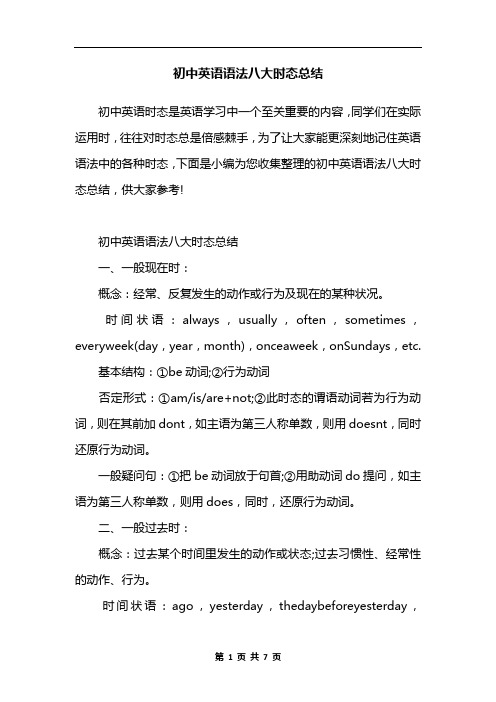
初中英语语法八大时态总结初中英语时态是英语学习中一个至关重要的内容,同学们在实际运用时,往往对时态总是倍感棘手,为了让大家能更深刻地记住英语语法中的各种时态,下面是小编为您收集整理的初中英语语法八大时态总结,供大家参考!初中英语语法八大时态总结一、一般现在时:概念:经常、反复发生的动作或行为及现在的某种状况。
时间状语:always,usually,often,sometimes,everyweek(day,year,month),onceaweek,onSundays,etc.基本结构:①be动词;②行为动词否定形式:①am/is/are+not;②此时态的谓语动词若为行为动词,则在其前加dont,如主语为第三人称单数,则用doesnt,同时还原行为动词。
一般疑问句:①把be动词放于句首;②用助动词do提问,如主语为第三人称单数,则用does,同时,还原行为动词。
二、一般过去时:概念:过去某个时间里发生的动作或状态;过去习惯性、经常性的动作、行为。
时间状语:ago,yesterday,thedaybeforeyesterday,lastweek(year,night,month),in1989,justnow,attheageof5,oneday,longlongago,onceuponatime,etc.基本结构:①be动词;②行为动词否定形式:①was/were+not;②在行为动词前加didnt,同时还原行为动词。
一般疑问句:①was或were放于句首;②用助动词do的过去式did提问,同时还原行为动词。
三、现在进行时:概念:表示现阶段或说话时正在进行的动作及行为。
时间状语:now,atthistime,thesedays,etc.基本结构:am/is/are+doing否定形式:am/is/are+not+doing.一般疑问句:把be动词放于句首。
四、过去进行时:概念:表示过去某段时间或某一时刻正在发生或进行的行为或动作。
现在完成时和一般过去时的区别
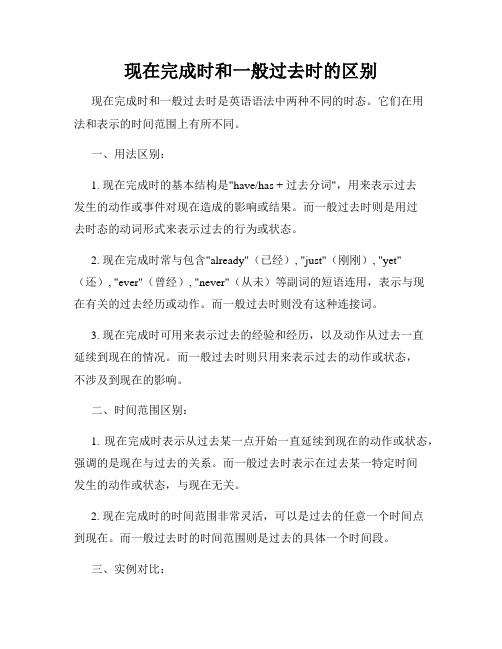
现在完成时和一般过去时的区别现在完成时和一般过去时是英语语法中两种不同的时态。
它们在用法和表示的时间范围上有所不同。
一、用法区别:1. 现在完成时的基本结构是"have/has + 过去分词",用来表示过去发生的动作或事件对现在造成的影响或结果。
而一般过去时则是用过去时态的动词形式来表示过去的行为或状态。
2. 现在完成时常与包含"already"(已经), "just"(刚刚), "yet"(还), "ever"(曾经), "never"(从未)等副词的短语连用,表示与现在有关的过去经历或动作。
而一般过去时则没有这种连接词。
3. 现在完成时可用来表示过去的经验和经历,以及动作从过去一直延续到现在的情况。
而一般过去时则只用来表示过去的动作或状态,不涉及到现在的影响。
二、时间范围区别:1. 现在完成时表示从过去某一点开始一直延续到现在的动作或状态,强调的是现在与过去的关系。
而一般过去时表示在过去某一特定时间发生的动作或状态,与现在无关。
2. 现在完成时的时间范围非常灵活,可以是过去的任意一个时间点到现在。
而一般过去时的时间范围则是过去的具体一个时间段。
三、实例对比:1. 现在完成时的例句:a) I have visited Paris three times.(我已经去过巴黎三次了。
)b) She has just finished her homework.(她刚刚完成了她的作业。
)c) Have you ever traveled to Japan?(你曾经去过日本吗?)上述例句表达的动作或经历与现在有关,时间范围是从过去到现在。
2. 一般过去时的例句:a) I visited Paris last year.(我去年去过巴黎。
)b) She finished her homework yesterday.(她昨天完成了她的作业。
(完整)初中英语6大时态
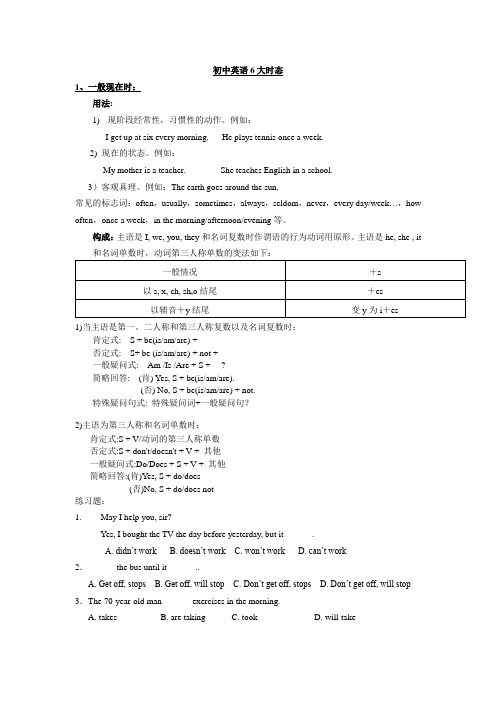
初中英语6大时态1、一般现在时:用法:1)现阶段经常性,习惯性的动作。
例如:I get up at six every morning. He plays tennis once a week.2) 现在的状态。
例如:My mother is a teacher. She teaches English in a school.3)客观真理。
例如:The earth goes around the sun.常见的标志词:often,usually,sometimes,always,seldom,never,every day/week…,how often,once a week,in the morning/afternoon/evening等。
构成:主语是I, we, you, they和名词复数时作谓语的行为动词用原形。
主语是he, she , it1)当主语是第一、二人称和第三人称复数以及名词复数时:肯定式: S + be(is/am/are) + ···否定式: S+ be (is/am/are) + not + ···一般疑问式: Am /Is /Are + S + ···?简略回答: (肯) Yes, S + be(is/am/are).(否) No, S + be(is/am/are) + not.特殊疑问句式: 特殊疑问词+一般疑问句?2)主语为第三人称和名词单数时:肯定式:S + V/动词的第三人称单数否定式:S + don't/doesn't + V + 其他一般疑问式:Do/Does + S + V + 其他简略回答:(肯)Yes, S + do/does(否)No, S + do/does not练习题:1.--- May I help you, sir?--- Yes, I bought the TV the day before yesterday, but it ______.A. didn’t workB. doesn’t workC. won’t workD. can’t work2.______ the bus until it ______..A. Get off, stopsB. Get off, will stopC. Don’t get off, stopsD. Don’t get off, will stop 3.The 70-year-old man ______ exercises in the morning.A. takesB. are takingC. tookD. will take用法:1).将要发生的动作。
初中英语必考-八大时态结构及用法详解
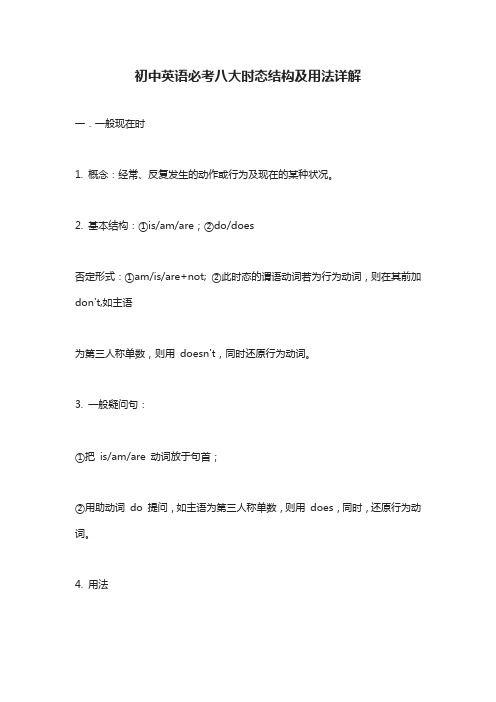
初中英语必考八大时态结构及用法详解一.一般现在时1. 概念:经常、反复发生的动作或行为及现在的某种状况。
2. 基本结构:①is/am/are;②do/does否定形式:①am/is/are+not; ②此时态的谓语动词若为行为动词,则在其前加don't,如主语为第三人称单数,则用doesn't,同时还原行为动词。
3. 一般疑问句:①把is/am/are 动词放于句首;②用助动词do 提问,如主语为第三人称单数,则用does,同时,还原行为动词。
4. 用法1)经常性或习惯性的动作,常与表示频度的时间状语连用。
例如:I leave home for school at 7 every morning. 每天早上我七点离开家。
2)客观真理,客观存在,科学事实。
例如:The earth moves around the sun. 地球绕太阳转动。
Shanghai lies in the east ofChina. 上海位于中国东部。
3)表示格言或警句。
例如:Pride goes before a fall 骄者必败。
注意:此用法如果出现在宾语从句中,即使主句是过去时,从句谓语也要用一般现在时。
例如:Columbus proved that the earth is round. 哥伦布证实了地球是圆的。
4)现在时刻的状态、能力、性格、个性。
例如:I don't want so much. 我不要那么多。
Ann writes good English but does not speak well.安英语写得不错,讲的可不行。
5)一般现在时表示将来含义。
a. 下列动词come, go, arrive, leave, start, begin, return 的一般现在时可以表示将来,主要用来表示在时间上已确定或安排好的事情。
例如:The train leaves at six tomorrow morning. 火车明天上午六点开。
初中英语时态总结表
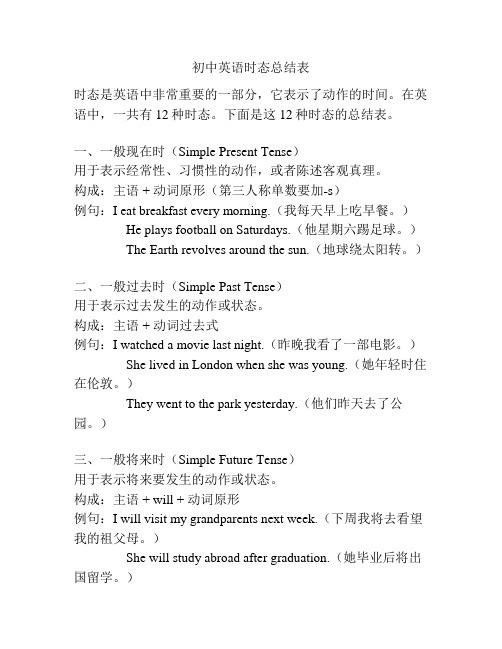
初中英语时态总结表时态是英语中非常重要的一部分,它表示了动作的时间。
在英语中,一共有12种时态。
下面是这12种时态的总结表。
一、一般现在时(Simple Present Tense)用于表示经常性、习惯性的动作,或者陈述客观真理。
构成:主语 + 动词原形(第三人称单数要加-s)例句:I eat breakfast every morning.(我每天早上吃早餐。
)He plays football on Saturdays.(他星期六踢足球。
)The Earth revolves around the sun.(地球绕太阳转。
)二、一般过去时(Simple Past Tense)用于表示过去发生的动作或状态。
构成:主语 + 动词过去式例句:I watched a movie last night.(昨晚我看了一部电影。
)She lived in London when she was young.(她年轻时住在伦敦。
)They went to the park yesterday.(他们昨天去了公园。
)三、一般将来时(Simple Future Tense)用于表示将来要发生的动作或状态。
构成:主语 + will + 动词原形例句:I will visit my grandparents next week.(下周我将去看望我的祖父母。
)She will study abroad after graduation.(她毕业后将出国留学。
)They will have a party on Friday.(他们将在星期五举行一个派对。
)四、现在进行时(Present Continuous Tense)用于表示现在正在进行的动作。
构成:主语 + am/is/are + 现在分词(-ing形式)例句:I am reading a book now.(我现在在读一本书。
)She is playing the piano at the moment.(她此刻正在弹钢琴。
现在完成时与一般过去时的区别
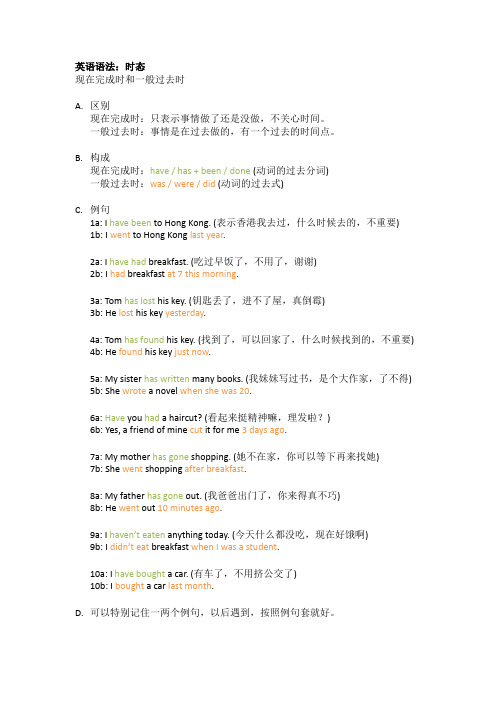
英语语法:时态现在完成时和一般过去时A.区别现在完成时:只表示事情做了还是没做,不关心时间。
一般过去时:事情是在过去做的,有一个过去的时间点。
B.构成现在完成时:have / has + been / done (动词的过去分词)一般过去时:was / were / did (动词的过去式)C.例句1a: I have been to Hong Kong. (表示香港我去过,什么时候去的,不重要) 1b: I went to Hong Kong last year.2a: I have had breakfast. (吃过早饭了,不用了,谢谢)2b: I had breakfast at 7 this morning.3a: Tom has lost his key. (钥匙丢了,进不了屋,真倒霉)3b: He lost his key yesterday.4a: Tom has found his key. (找到了,可以回家了,什么时候找到的,不重要) 4b: He found his key just now.5a: My sister has written many books. (我妹妹写过书,是个大作家,了不得) 5b: She wrote a novel when she was 20.6a: Have you had a haircut? (看起来挺精神嘛,理发啦?)6b: Yes, a friend of mine cut it for me 3 days ago.7a: My mother has gone shopping. (她不在家,你可以等下再来找她)7b: She went shopping after breakfast.8a: My father has gone out. (我爸爸出门了,你来得真不巧)8b: He went out 10 minutes ago.9a: I haven’t eaten anything today. (今天什么都没吃,现在好饿啊)9b: I didn’t eat breakfast when I was a student.10a: I have bought a car. (有车了,不用挤公交了)10b: I bought a car last month.D.可以特别记住一两个例句,以后遇到,按照例句套就好。
现在完成时与一般过去时的用法区别

现在完成时与一般过去时的用法区别现在完成时和一般过去时是英语中两种不同的时态,它们在用法上有一些区别。
本文将重点探讨这两种时态的用法区别。
一、现在完成时的基本用法现在完成时用于表示过去发生的某个动作或状态与现在的关联。
它通常与以下情况相关:1. 完成的动作对现在造成影响例如:- I have finished my homework.(我已经完成了我的作业。
)这句话表示现在我没有作业要做了。
2. 过去开始的动作或状态一直延续到现在例如:- She has lived in London for five years.(她已经在伦敦住了五年了。
)这句话表示她从过去到现在一直在伦敦居住。
3. 表示已经发生或完成的动作,对时间没有具体的限定例如:- Have you ever been to Japan?(你去过日本吗?)这句话没有具体的时间限定,只是问对方是否去过日本。
二、一般过去时的基本用法一般过去时用于表示过去某个确定的时间或发生的动作或状态。
它通常与以下情况相关:1. 过去某个具体的时间例如:- I went to the park yesterday.(我昨天去了公园。
)这句话表示动作发生在昨天,过去已经完成。
2. 描述过去的事件或情况例如:- She studied in Paris when she was young.(她年轻时在巴黎学习。
)这句话描述的是过去的情况,已经结束。
3. 描述过去的习惯或经常性行为例如:- I used to play basketball every weekend.(过去我每个周末都会打篮球。
)这句话描述的是过去的习惯,不再进行。
三、现在完成时与一般过去时的主要区别现在完成时和一般过去时有以下主要区别:1. 时间范围不同现在完成时没有具体的时间范围限制,可以涉及过去的任何时间点;而一般过去时通常与特定的过去时间相关。
2. 对现在的影响不同现在完成时强调动作或状态与现在的关联,对现在产生影响或结果;而一般过去时则仅仅描述过去发生的动作或状态。
初中英语6个时态

初中英语6个时态
初中英语六个时态分别是:现在进行时、现在完成时、现在完成进行时、一般过去时、一般将来时和过去将来时。
1. 现在进行时:表示现在正在进行的动作或存在的状态,基本结构是be动词(am/is/are)+动词的现在分词(动词+ing)。
2. 现在完成时:表示动作发生在过去但与现在有联系,基本结构是have/has+动词的过去分词(done)。
3. 现在完成进行时:表示动作从过去开始一直持续到现在,并且还会继续下去,基本结构是have/has+been+动词的现在分词(doing)。
4. 一般过去时:表示在过去某个时间发生的动作或存在的状态,基本结构是动词的过去式。
5. 一般将来时:表示将来某个时间将要发生的动作或存在的状态,基本结构是will+动词原形。
6. 过去将来时:表示在过去某个时间将要发生的动作或存在的状态,基本结构是would+动词原形。
一般过去时与现在完成时
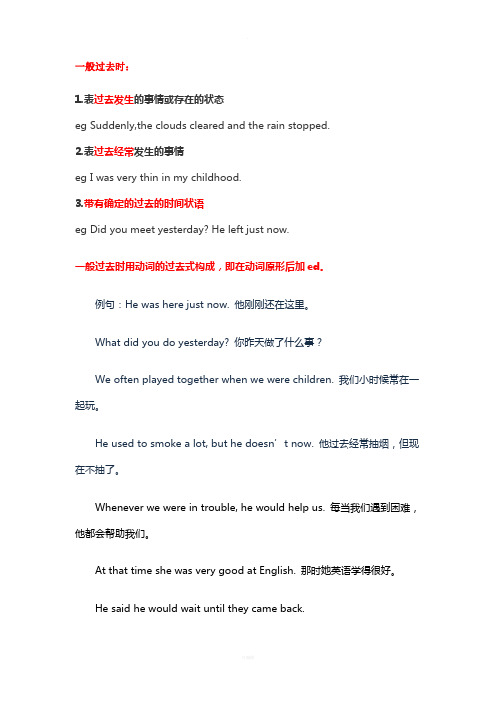
一般过去时:1.表过去发生的事情或存在的状态eg Suddenly,the clouds cleared and the rain stopped.2.表过去经常发生的事情eg I was very thin in my childhood.3.带有确定的过去的时间状语eg Did you meet yesterday? He left just now.一般过去时用动词的过去式构成,即在动词原形后加ed。
例句:He was here just now. 他刚刚还在这里。
What did you do yesterday? 你昨天做了什么事?We often played together when we were children. 我们小时候常在一起玩。
He used to smoke a lot, but he doesn’t now. 他过去经常抽烟,但现在不抽了。
Whenever we were in trouble, he would help us. 每当我们遇到困难,他都会帮助我们。
At that time she was very good at English. 那时她英语学得很好。
He said he would wait until they came back.一般过去时详细解析:主要是用来描述在过去某个时候发生的动作或存在的状态。
它也可以用来表示在过去某段时间里经常发生的习惯性动作。
这一点在表达意义上与一般现在时相同,只是所在的时间区域不同而已。
由于它的主要作用如此,所以在使用一般过去时的句子里常常有一个意义较具体的过去时间状语。
这也是它与现在完成时的最大区别之一。
一般过去时由谓语动词的过去式表示,也就是说动词词末要加-ed〔除不规那么动词外〕。
常和一般过去时连用的过去时间状语有:last night (week , month , year , century , etc.) , yesterday , the day before yesterday , yesterday morning ( afternoon , evening ) , in 1999 , two hours ago ( one week ago , tree years ago , …)等等。
初中英语的动词时态主要有五种
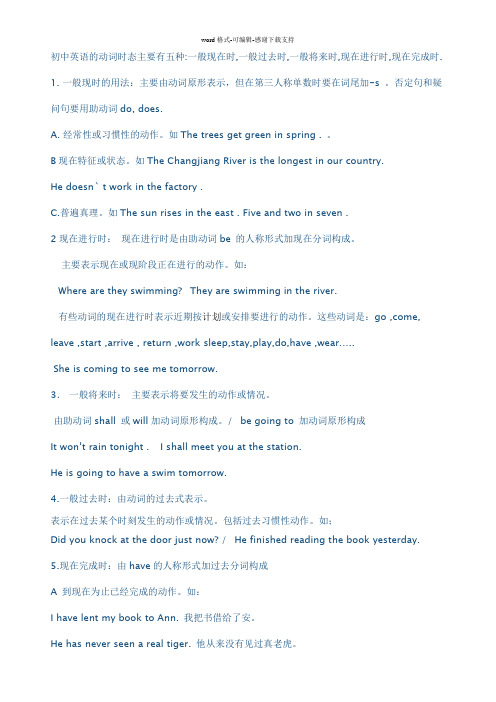
初中英语的动词时态主要有五种:一般现在时,一般过去时,一般将来时,现在进行时,现在完成时.1. 一般现时的用法:主要由动词原形表示,但在第三人称单数时要在词尾加-s 。
否定句和疑问句要用助动词do, does.A. 经常性或习惯性的动作。
如The trees get green in spring . 。
B现在特征或状态。
如The Changjiang River is the longest in our country.He doesn` t work in the factory .C.普遍真理。
如The sun rises in the east . Five and two in seven .2现在进行时:现在进行时是由助动词be 的人称形式加现在分词构成。
主要表示现在或现阶段正在进行的动作。
如:Where are they swimming? They are swimming in the river.有些动词的现在进行时表示近期按计划或安排要进行的动作。
这些动词是:go ,come, leave ,start ,arrive , return ,work sleep,stay,play,do,have ,wear…..She is coming to see me tomorrow.3.一般将来时:主要表示将要发生的动作或情况。
由助动词shall 或will加动词原形构成。
/ be going to 加动词原形构成It won’t rain tonight .I shall meet you at the station.He is going to have a swim tomorrow.4.一般过去时:由动词的过去式表示。
表示在过去某个时刻发生的动作或情况。
包括过去习惯性动作。
如;Did you knock at the door just now? / He finished reading the book yesterday.5.现在完成时:由have的人称形式加过去分词构成A 到现在为止已经完成的动作。
初中英语八大时态总结
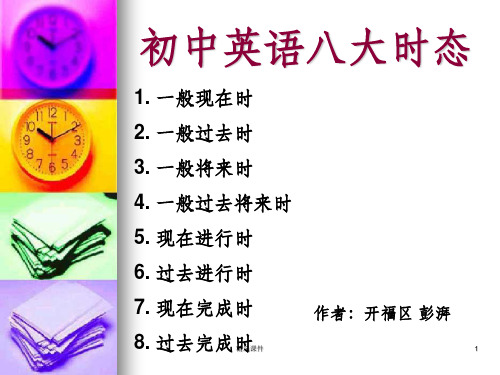
3. 一般将来时
will 加原型。
4. 一般过去将来时 would 加原型。
5. 现在进行时 6. 过去进行时 7. 现在完成时 8. 过去完成时精选课件
am/ is/ are +ing。 was/ were +ing。 have/ has + ed。 had + ed。
10
一般现在时 一般现在时,在没有be动词和助动词have,has,
一般现在时
精选课件
19
我昨天踢足球了。
一般过去时
精选课件
20
两星期前我说 过我将踢足球。
一般过去将来时
精选课件
21
我现在正 在踢足球。
现在进行时
精选课件
22
昨天的这个时候 我正在踢足球。
过去进行时
精选课件23Fra bibliotek我已经踢完足球了。
现在完成时
精选课件
24
昨天,你见到我 的时候,我早就 踢完足球了。
精选课件
8
过去完成时
含义:有两个过去时,其中一 个过去时比另一个过去时还要 过去,即一个动作发生在“过 去的过去”。 例如:昨天下午 我走进教室的时候同学们早就 坐好了、昨天当我走进电影院 的时候电影早就开始了。·
精选课件
9
初中英语八大时态
1. 一般现在时 2. 一般过去时
三单s,es其它无变化。 词尾加ed。
否: I did’t work here.
问:Did you work here?
答:Yes, I did./ No, I didn’t.
精选课件
12
一般将来时
肯: I wil work here.
初中英语六大时态

初中英语六大时态一.一般现在时二.一般过去时三.一般将来时四.现在进行时五.过去进行时六.现在完成时一、一般现在时1.表示现阶段经常性、习惯性的动作或存在的状态,特征;常用时间状语:always (总是) usually (常常) often (经常) sometimes (有时) seldom (很少,少到可忽略不计) never (从不) every day (每天)/week (每周),等「注:seldom 与never 都是否定用法」例句:I always go to school by bus in order to get to the class on time.为了准时去上课,我总是坐公交车上学 He seldom does his homework which make his teacher so mad.他几乎不做作业,这让他的老师非常恼火(※注:主语为第三人称时动词的变化 go →goes )2.在时间状语和条件状语从句中,用一般现在时表将来例句:If you don ’t harry up,you will be late !time 2 1 3如果你不快一点就要迟到啦!You mustn’t eat any thing until you go to hospital.你不能吃任何东西直到你去看医生后「※注:其实就是“主将从现”」3.表示客观真理和事实的时候用一般现在时例句:The sun rises in the east.太阳从东边升起The earth moved around the sun.地球围着太阳转4.begin、come、go、leave、start、arrive等动词常用一般现在时表示按规定按计划将要发生的动作例句:Class begins at 8 in the morning.8点开始上课二、一般过去时1.一般过去时表示过去某时间发生的动作、存在的状态或过去反复发生的动作。
初中英语所有时态

初中英语所有时态1.一般现在时(do/does; is/am/are)①表示现在的情况、状态或特征。
例:He is a student.他是一个学生。
②表示经常性、习惯性动作。
例:He always helps others.他总是帮助别人。
③客观事实和普遍真理。
例:The earth moves the sun.地球绕着太阳转。
④表示一个按规定、计划或安排要发生的动作。
仅限于某些表示“来、去、动、停、开始、结束、继续”等的动词,可以与表示未来时间的状语搭配使用。
常见的用法是:飞机、火车、轮船、汽车等定期定点运行的交通方式。
例:The next train leaves at 3 o'clock this afternoon.下一趟火车今天下午3点开车。
⑤在时间、条件和让步状语从句中经常用一般现在(有时也用现在完成时)表示将的来事情。
(即:主将从现原则)例:I will call you as soon as I arrive at the airport.我一到机场就会给你打电话。
When you have finished the report, I will have waited for about 3 hours.等你完成这份报告的时候,我就已经等了将近3个小时了。
2. 现在进行时(am/is/are doing)①表示此时此刻正在发生的事情。
例:He is listning to the music now.他现在正在听音乐。
②表示目前一段时间内一直在做的事情,但不一定此时此刻正在做。
例:I am studying computer this term.这个学期我一直在学习计算机。
③现在进行时可以表示将来的含义。
瞬时动词的进行一定表将来。
例:I am leaving.我要离开了。
持续动词的进行只有有将来的时间状语或有将来语境中才表将来。
例:I am travelling next month.下个月我要去旅行。
现在完成时和一般过去时
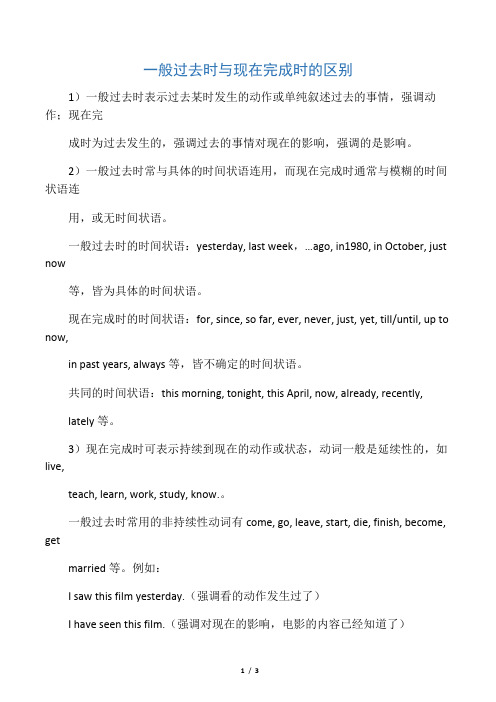
一般过去时与现在完成时的区别1)一般过去时表示过去某时发生的动作或单纯叙述过去的事情,强调动作;现在完成时为过去发生的,强调过去的事情对现在的影响,强调的是影响。
2)一般过去时常与具体的时间状语连用,而现在完成时通常与模糊的时间状语连用,或无时间状语。
一般过去时的时间状语:yesterday, last week,…ago, in1980, in October, just now等,皆为具体的时间状语。
现在完成时的时间状语:for, since, so far, ever, never, just, yet, till/until, up to now,in past years, always等,皆不确定的时间状语。
共同的时间状语:this morning, tonight, this April, now, already, recently,lately等。
3)现在完成时可表示持续到现在的动作或状态,动词一般是延续性的,如live,teach, learn, work, study, know.。
一般过去时常用的非持续性动词有come, go, leave, start, die, finish, become, getmarried等。
例如:I saw this film yesterday.(强调看的动作发生过了)I have seen this film.(强调对现在的影响,电影的内容已经知道了)Why did you get up so early?(强调起床的动作已发生过了)Who hasn't handed in his paper?(强调有卷子未交,疑为不公平竞争)He has been in the League for three years.(在团内的状态可延续)He has been a League member for three years.(是团员的状态可持续)句子中如有过去时的时间副词(如yesterday, last, week, in 1960)时,不能使用现在完成时,要用过去时。
一般过去时和现在完成时的区别
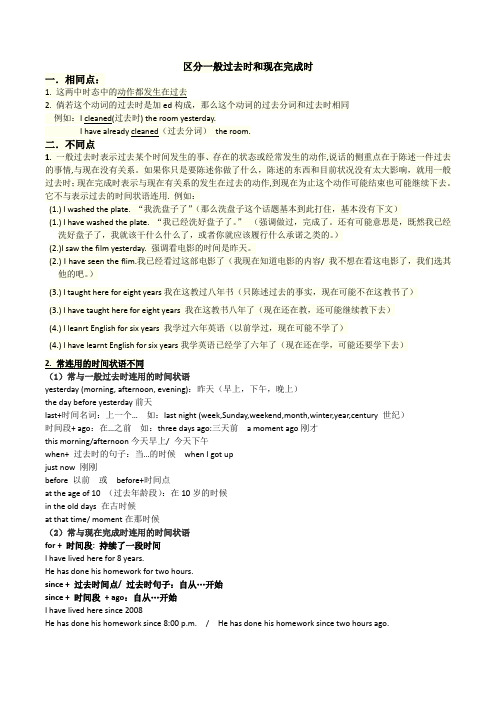
区分一般过去时和现在完成时一.相同点:1. 这两中时态中的动作都发生在过去2. 倘若这个动词的过去时是加ed构成,那么这个动词的过去分词和过去时相同例如:I cleaned(过去时) the room yesterday.I have already cleaned(过去分词)the room.二.不同点1. 一般过去时表示过去某个时间发生的事、存在的状态或经常发生的动作,说话的侧重点在于陈述一件过去的事情,与现在没有关系。
如果你只是要陈述你做了什么,陈述的东西和目前状况没有太大影响,就用一般过去时;现在完成时表示与现在有关系的发生在过去的动作,到现在为止这个动作可能结束也可能继续下去。
它不与表示过去的时间状语连用. 例如:(1.) I washed the plate. “我洗盘子了”(那么洗盘子这个话题基本到此打住,基本没有下文)(1.) I have washed the plate. “我已经洗好盘子了。
”(强调做过,完成了。
还有可能意思是,既然我已经洗好盘子了,我就该干什么什么了,或者你就应该履行什么承诺之类的。
)(2.)I saw the film yesterday. 强调看电影的时间是昨天。
(2.) I have seen the flim.我已经看过这部电影了(我现在知道电影的内容/ 我不想在看这电影了,我们选其他的吧。
)(3.) I taught here for eight years我在这教过八年书(只陈述过去的事实,现在可能不在这教书了)(3.) I have taught here for eight years 我在这教书八年了(现在还在教,还可能继续教下去)(4.) I leanrt English for six years 我学过六年英语(以前学过,现在可能不学了)(4.) I have learnt English for six years我学英语已经学了六年了(现在还在学,可能还要学下去)2. 常连用的时间状语不同(1)常与一般过去时连用的时间状语yesterday (morning, afternoon, evening):昨天(早上,下午,晚上)the day before yesterday前天last+时间名词:上一个…如:last night (week,Sunday,weekend,month,winter,year,century 世纪)时间段+ ago:在…之前如:three days ago:三天前 a moment ago刚才this morning/afternoon今天早上/ 今天下午when+ 过去时的句子:当…的时候when I got upjust now 刚刚before 以前或before+时间点at the age of 10 (过去年龄段):在10岁的时候in the old days 在古时候at that time/ moment在那时候(2)常与现在完成时连用的时间状语for + 时间段: 持续了一段时间I have lived here for 8 years.He has done his homework for two hours.since + 过去时间点/ 过去时句子:自从…开始since + 时间段+ ago:自从…开始I have lived here since 2008He has done his homework since 8:00 p.m. / He has done his homework since two hours ago.just:刚刚I have just called youever: 曾今、从来Have you even been to Beijing?Has he ever made such a mistake?never: 从未从来没有I have never been there before.already已经I have already finished my homework.yet: 还(否定句)已经(疑问句)I haven’t finished my homework yet.Have you finshed your homework yet?before: 以前Have you eaten seafood before?I haven’t seen him before.so far 到目前为止I have finished 50% of the work.In the past + 时间段用just ever never already yet before填空他刚从学校回来He has __ come back from school你以前去过广州吗?Have you been to Guangzhou __?我以前从没去过广州。
- 1、下载文档前请自行甄别文档内容的完整性,平台不提供额外的编辑、内容补充、找答案等附加服务。
- 2、"仅部分预览"的文档,不可在线预览部分如存在完整性等问题,可反馈申请退款(可完整预览的文档不适用该条件!)。
- 3、如文档侵犯您的权益,请联系客服反馈,我们会尽快为您处理(人工客服工作时间:9:00-18:30)。
现在完成时是表示过去的动作与现在的联系,主要说明的是现在的情况和状态; 而一般过去时则强调动作发生在过去某一时间,与现在不发生联系.
e.g.
① We haven‘t seen him since last year. 我们自从去年以来一直未见到他。(现在还未见到)
② We didn‘t see him last year.
Exercises for the present perfect tense:
7. Is Tom doing his homework? No, he _h_a_s_f_in_i_s_h_e_d_his homework already.(finish)
8. Do you know Miss King? No, but I _h_a_v_e_h_e_a_r_e_d_o__f _ her before .(hear of)
11. How does he get on with his classmate? Oh, he _h_a_s_c_h_a_n_g_e_d_ a lot these days. (change)
12. Help yourself , please. No, thanks. I’m full. I _h_a_v_e_ just _ea_t_e_n_ three eggs.(eat)
Choose the right answer,please!
( C) 1.How long has Mr Turner worked in this school?
A.30 years. B. Since it was open. C.5 years.
( B ) 2.What month is it now?
A. October. B. November. C. December.
( C) 3.Who’s ill in hospital?
A. Kate. B. Mr Wu.
books in some boxes, but he cocualnd’nt’t find any boxes. Ted tteolledd him the boxes wearse in the next room. Then he bbrought these boxes to his father.
我们去年没见到他。(现在不一定未见到)
③ Who has opened the door?
谁把门开了?(现在门还开着)
④ Who opened the door?
谁开的门? (指过去,与现在无关。现在门是关着还是开着,没有说明。)
⑤ — Have you had your lunch?
你吃过午饭没有? (意即你现在不饿吗?)
现在完成时的谓语用“助动词have /has +过去分词”
一般过去时和现在完成时的区别:
2)用法不同
I had supper an hour ago.我一小时前吃的晚饭。(表示过去的动作) I have just had supper.我刚刚吃过晚饭。(强调对现在的影响———我不饿) He was a teacher then.他那时是个教师。(表示过去的状态) He has been a teacher since then.他从那时起一直当教师。(他现在还是教师)
sweep
after class
Last Sunday
Correct the passage:
Last Sunday, Ted and his father wareere at home. They mmovoevdd to a new house. His father wantteedd to put the
Make up sentences, please!
go eat leave ride
last year this morning yesterday just now
give write catch make a mistake pay
a moment ago last night when I was only 10 the day before yesterday the next morning
— Yes, I have. 吃了。
(意即我现在饱了,不要再吃了。)
— When did you have it?
你什么时候吃的? (说话人感兴趣的是“吃”这一动作发生在时。)
一般过去时常与具体的时间状语连用,现在完 成时常与模糊的时间状语连用,或无时间状语。
一般过去时的时间状语: yesterday, once, last week, ... ago, in 1980, in October, just now等具体的时间状语。 现在完成时的时间状语: for, since, so far, ever, never, just, yet, till, up to now, always等不确定的时间状语。
现在完成时与一般过 tense & the simple past tense
概念: 一般过去时和现在完成时的区别:
❖ 一般过去时表示在过去某个时间发生的动词或存在的 状态,也表示过去经常或反复发生的动作。
e.g. He came here yesterday.
❖ 现在完成时表示过去的动作(或状态)对现在产生的 影响和结果
e.g. He has broken his bottle.
一般过去时和现在完成时的区别:
1)构成不同 Tom went to London last year. Lily has been to London twice.
一般过去时的谓语动词用过去式,
9. What about the film? Sorry, I don’t know. I _h_a_v_e_n_’t_s_e_e_n_ it yet. (see)
10. _H__a_v_e___ youeveverer __b_e_e_n____ to the Great Wall? No, never. ( go)
